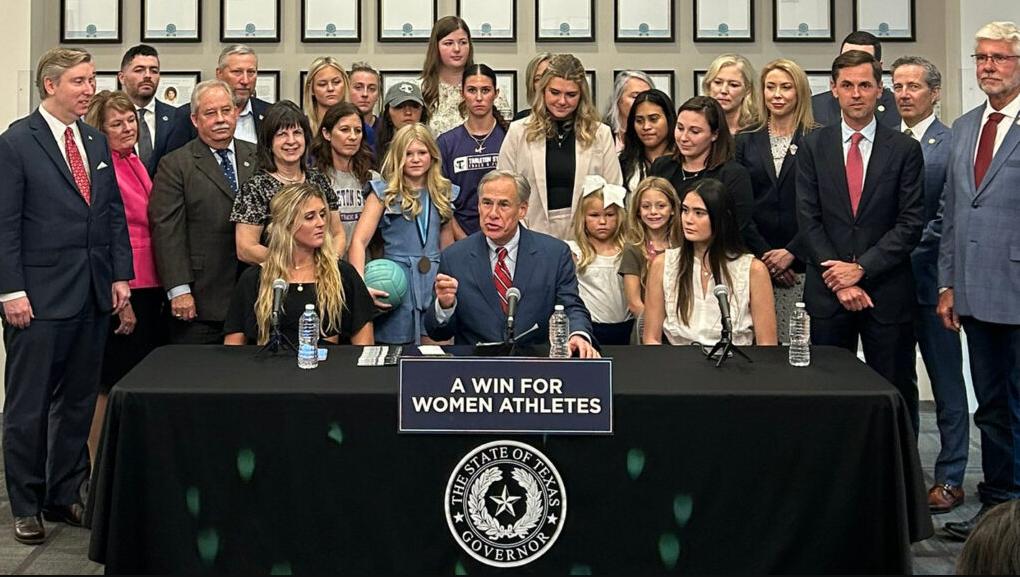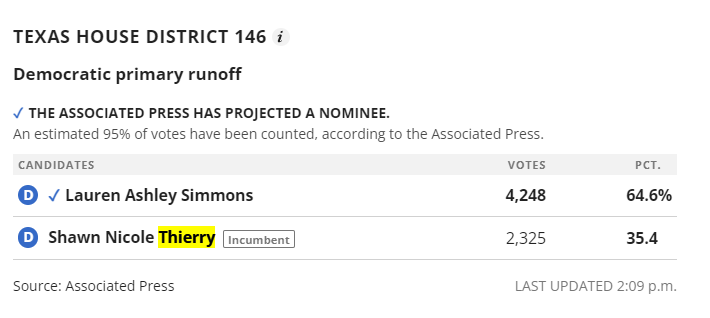Texas
Anti-trans Texas Democrat loses primary to queer woman
Lauren Ashley Simmons defeated state Rep. Shawn Thierry

BY ERIN REED | Houston Democratic Texas House of Representatives incumbent Shawn Thierry was trounced in a primary runoff election on Tuesday.
Thierry was one of only a handful of Democrats across the country who broke ranks with her party and voted for a ban on gender-affirming care for transgender youth, delivering a lengthy and misinformation-filled speech in doing so.
After her anti-trans vote, queer union organizer Lauren Ashley Simmons stepped forward to unseat her, earning dozens of influential endorsements from party leaders and organizations. On Tuesday night, Simmons left no doubt about her victory: She resoundingly won by a 65-35 percent margin.
On May 12, Thierry voted to pass a gender-affirming care ban for trans youth, an exceedingly rare vote for a Democrat. In doing so, she spoke on the House floor, calling trans girls “biological males” and arguing that conversion therapy was the true solution to gender dysphoria.
She also voted against every amendment intended to mitigate the harm the bill would cause trans youth in the state. This led to a vote to censure Thierry by the Meyerland Area Democrats, who reported feeling betrayed by her earlier assurances that she was an ally to the LGBTQ community.
Thierry’s district, the 146th District of the Texas House of Representatives, is not a swing district. It includes predominantly Black and Latino neighborhoods in Houston that tend to vote heavily Democratic. Previously, Thierry had beaten a Libertarian candidate by a 87-13 percent margin, with no Republican running in the race. Thus, whoever wins the Democratic primary in the district is likely to represent the district in the Texas House of Representatives.
Enter Simmons, a queer union organizer who ran in opposition to Thierry’s anti-LGBTQ votes and activism. In her announcement that she would be challenging Thierry in the primary, Simmons stated, “Our current representative has lost her way and now votes with Greg Abbott and Republicans to take away our rights, destroy our public schools, and hurt our kids.”
Simmons quickly garnered major endorsements, an uncommon feat for a primary challenger to an incumbent politician. Equality Texas, the LGBTQ+ Victory Fund, and LPAC, all significant LGBTQ organizations, endorsed her.
She also secured major union endorsements from the American Federation of Teachers, the AFL-CIO, and the Service Employees International Union. Additional support came from Planned Parenthood, Harris County Young Democrats, and Run for Something. High-profile congressional endorsements included Congresswomen Jasmine Crockett and Lizzie Fletcher, as well as former Congressman Beto O’Rourke.
In the lead-up to the election, which was quickly becoming a referendum on whether anti-trans politics could gain a foothold in the Democratic Party, Thierry did not tone down her anti-LGBTQ sentiment. She participated in “faith walks” with major local churches supportive of her stance and relied heavily on Republican donations.
When asked about her anti-trans votes, she called gender-affirming care “Black genocide.” Thierry’s statements were decried by major community members, including Diamond Stylz Collier, who leads the Texas nonprofit Black Trans Women Inc. Collier called the comments disgusting, stating, “We have an increase of trans people dying of violence around the country and a real-life genocide happening in other parts of the globe.”
As votes poured in on Tuesday evening, it became clear that Simmons would be the victor. She secured a decisive majority, with the district voting 65-35 percent in her favor over Thierry. Reflecting on her victory, Simmons stated, “Thanks to your amazing support, we all won BIG last night! We are so grateful, and so proud of the strong message this decisive victory sends to those who seek political gain by using bigotry, hatred, and fear: STOP. Thank you!”
Increasingly, anti-trans influencers are attempting to make inroads into left-leaning politics, a strategy that has seen mixed results internationally. In the U.K., for instance, the Labour Party has been notoriously poor on trans rights.
In the U.S., however, these efforts have met with far less success. Just yesterday in California, an attempt to place a gender-affirming care ban on the ballot was defeated. Similarly, in most states, Democrats have remained steadfast against anti-transgender legislation. Now, even in a conservative state like Texas, it is evident that there is little appetite within the party for sacrificing transgender rights, and doing so could jeopardize one’s political career.
******************************************************************************************

Erin Reed is a transgender woman (she/her pronouns) and researcher who tracks anti-LGBTQ+ legislation around the world and helps people become better advocates for their queer family, friends, colleagues, and community. Reed also is a social media consultant and public speaker.
******************************************************************************************
The preceding article was first published at Erin In The Morning and is republished with permission.
Texas
Texas Supreme Court rules judges can refuse to marry same-sex couples
Decision published on Oct. 24.

Texas judges will now be permitted to refuse to officiate same-sex weddings based on their “sincerely held religious beliefs,” following a ruling issued Oct. 24 by the Texas Supreme Court.
The state’s highest court — composed entirely of Republican justices — determined that justices of the peace who decline to marry LGBTQ couples are not violating judicial impartiality rules and therefore cannot be sanctioned for doing so.
In its decision, the court approved an official comment to the Texas Code of Judicial Conduct clarifying that judges may opt out of performing weddings that conflict with their personal religious convictions. This clarification appears to directly conflict with existing provisions that prohibit judges from showing bias or prejudice toward individuals based on characteristics such as race, religion, or sexual orientation.
“It is not a violation of these canons for a judge to publicly refrain from performing a wedding ceremony based upon a sincerely held religious belief,” the court’s comment states.
The original code explicitly bars judges from showing favoritism or discrimination, declaring that they must not “manifest bias or prejudice, including but not limited to bias or prejudice based upon race, sex, religion, national origin, disability, age, sexual orientation, or socioeconomic status.”
The case traces back to McLennan County Justice of the Peace Dianne Hensley, who was publicly reprimanded in 2019 after refusing to marry same-sex couples while continuing to perform ceremonies for heterosexual ones, the Texan reported.
The State Commission on Judicial Conduct found that her actions cast doubt on her ability to act impartially, but Hensley has spent the past six years challenging that reprimand in court, arguing that she was punished for adhering to her Christian beliefs.
In a statement responding to the Oct. 24 ruling, Texas House LGBTQ Caucus Chair Jessica González expressed disappointment with the decision.
“The Texas House LGBTQ Caucus is disappointed, but not surprised, to learn that the Texas Supreme Court is not willing to stand up for the rights of LGBTQIA+ Texans,” she said. “Our right to marriage should never depend on someone else’s religious beliefs. This change in the Judicial Conduct Code will only further erode civil rights in Texas.”
The Texas Supreme Court is also currently reviewing a related matter referred by the 5th U.S. Court of Appeals. That case involves another judge, Keith Umphress, who similarly refused to perform same-sex weddings for religious reasons. The 5th Circuit has asked the Texas justices to clarify whether the state’s judicial conduct code actually forbids judges from publicly declining to officiate same-sex weddings while continuing to perform ceremonies for straight couples — a question that could further define the boundaries between religious liberty and judicial impartiality in Texas.
Texas
Democrats block anti-trans legislation by breaking quorum in Texas
Lawmakers flee state to halt GOP-backed redistricting and anti-trans policies

As Texas House Democrats fled the state to prevent Republicans from gerrymandering Democratic-held districts to flip seats, they also blocked anti-transgender legislation from being considered simply by not showing up.
More than 50 House Democrats left Texas on Sunday in an attempt to pause—if not kill—recent Republican-proposed and Trump-encouraged measures making their way through the state House.
This move by Democrats is called “breaking quorum,” and means the Texas House has fewer than the required minimum number of representatives present to conduct business. In total, the Texas House has 150 seats. Republicans hold only 88 seats—less than the 100 required to meet quorum—pausing the legislative session.
The Democratic legislators traveled to Illinois and New York, two Democratic strongholds with outspoken governors vowing to protect them and prevent Republicans from gaining an unfair advantage in the middle of the legislative calendar—at Trump’s behest.
The major issue Texas Democrats are drawing attention to is the recent redistricting plan, which would flip five Democratic U.S. House of Representatives seats to Republican ones through the use of gerrymandering, or strategic manipulation of district boundaries. This gerrymandering would likely result in Republicans retaining control of the U.S. House in the 2026 midterms.
In addition to redistricting, Republicans have proposed Senate Bill 7 (SB7), also known as “The Trans Bathroom Ban.” This bill mandates that people use the bathroom in government buildings, schools, and women’s violence shelters that corresponds with their sex at birth, rather than their gender identity. The bill would also require incarcerated individuals to be placed in facilities that match their sex at birth.
Proponents of the bill, like Fran Rhodes, the president of True Texas Project—a hardline conservative group that opposes LGBTQ rights and immigration—argue that without SB7, “we put women and girls at risk.”
This proposed legislation has been denounced by Equality Texas, which says it would not only put trans women at risk, but also cis women, who would be subject to “invasive gender inspections.” They argue this would undermine the Republicans’ stated intent of the bill by subjecting women to unnecessary scrutiny rather than protecting them.
Multiple cis women have come out in opposition to the bill, including Wendy Davis, a lawyer and former member of the Texas State Senate, who called the bill “a solution without a problem.”
Davis continued, saying that “Our trans sisters deserve to be safe in the restroom, just like we deserve to be safe in the restroom.”
Additionally, some Black Texans have sounded the alarm on this bill, likening it to Jim Crow-era segregation legislation—but instead of skin color, it uses gender identity to discriminate.
As the clock runs out on this 30-day special session ending Aug. 19, there is a chance Republican Gov. Greg Abbott could extend the session, as it is within his power as governor.
Texas Democrats hope this will pressure Republicans to work with them to reach a compromise on both redistricting and killing the anti-trans bill.
Texas
Texas lawmaker introduces bill to criminalize identifying as transgender
Republican’s proposal unlikely to pass

Republican Texas state Rep. Tom Oliverson introduced a bill last week that would prohibit Texans from identifying themselves as transgender on official documents.
The legislation would classify as a state felony the act of “knowingly [making] a false or misleading verbal or written statement” by identifying one’s birth sex incorrectly to a governmental entity or to an employer.
While the bill, according to the Houston Chronicle, does not yet have any cosponsors and is considered unlikely to pass, the effort underscores conservative lawmakers’ turn toward increasingly extreme measures targeting the trans community, particularly in Texas.
For example, Republican state Rep. Brent Money introduced a bill last month that would have expanded the 2023 law barring gender affirming health treatments for minors by also prohibiting providers from offering puberty-suppressing medication, hormone therapy or surgeries to adults if the purpose is to affirm their gender identity.
Equality Texas reports that the state legislature has seen more than 170 bills targeting the LGBTQ community so far this year.
Oliverson in 2024 unsuccessfully challenged the chamber’s Republican speaker, Dade Phelan.




















